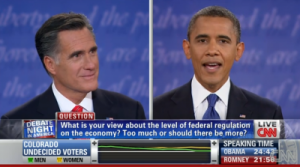
Courtesy of adage.com
There was something unsettling to me about the presidential debate this past Tuesday, Oct. 16.
President Obama and former Governor Mitt Romney were both wearing flag pins, so no issue there. It wasn’t the mismatched color of the candidates’ ties; that was actually refreshing. Even the informal, meandering, on-the-verge-of-a-fist-fight town hall setting wasn’t that unnerving. The most unsettling part of CNN’s debate coverage was the graph at the bottom of the screen — and everything it represents.
The graph consisted of two animated lines, moving up and down, representing the second-to-second opinions of both male and female undecided voters. While the oversimplified presentation of the graph was disconcerting (this is why China is beating us in math and science — CNN can’t label the axes on their graphs) and its mere presence was distracting from the debate itself, it was the data source that really worried me.
I’m not quite sure what the rapidly fluctuating opinions of an anonymous pool of voters was supposed to add, but it surely didn’t add anything. Furthermore, the idea behind this graph is at the foundation of our devolved political system.
When I picture a room full of people judging politics by literally pressing a button or turning a dial when they like something, I see a problem. It’s literally a technological step or two backwards from a caveman grunt of agreement:
Romney hire women. Arrrghhh. Me like. Press button.
People don’t make decisions anymore — they simply have opinions. It’s the imperative difference between just pressing the button and pausing to think about why you’re pressing the button.
Maybe it doesn’t even matter. Maybe this can’t be fixed. After all, politicians must simplify things for the uninformed masses and get themselves elected using whatever means necessary. But just because politicians resort to these methods doesn’t mean we should follow them. I personally hold this nation to a higher standard.
This is a matter of principle, which we’ve lost in our political system. We don’t want to do what’s best; we want to win. The principles of discussion, of evidence, of changing your mind — they’re all swept away in a flood of logical fallacies and attack ads. Most voters act the same way — as if they’re living in an attack ad.
I once heard a woman vehemently claim that she wasn’t voting for Obama because he was a communist. When asked to elaborate, she couldn’t even explain what a communist was. She just kept yelling that Obama was one and that we should all “study it out.” Whatever that means.
I don’t care that the woman thought Obama was a communist; I care that she had no reason. Maybe he is a communist. I don’t know. But I do know that anyone who is sure of anything is just trying to sell you something. Yet everyone behaves as if we’re sure beyond all doubt.
When a candidate throws out a pretty number, don’t just believe him or her — even if you like his or her political party better.
When you hear a soundbite, don’t automatically take it out of context — even if Jon Stewart is really funny. When you see an opinion graph on CNN, don’t let that sway your view — even if all the cool kids are doing it.
It’s hard not to jump to conclusions. It’s hard to fight the urge to just push that button. To stop being sure and doubt yourself. Cautious self-doubt: That’s reasoning. And it’s really, really hard. Button pushing is way more fun. But pausing before you press is the only way things are going to get better.
So, this election, try to put aside your affiliations and beliefs and supposed truths and take an hour or two to doubt. Doubt yourself and your assumptions. Doubt the words of pundits and parents and papers and even politicians. Just pause and doubt.
Keep talking, but more importantly, listen. And, above all, assume nothing. Especially not the axes on a CNN graph.
Esce is a member of the class of 2015.





